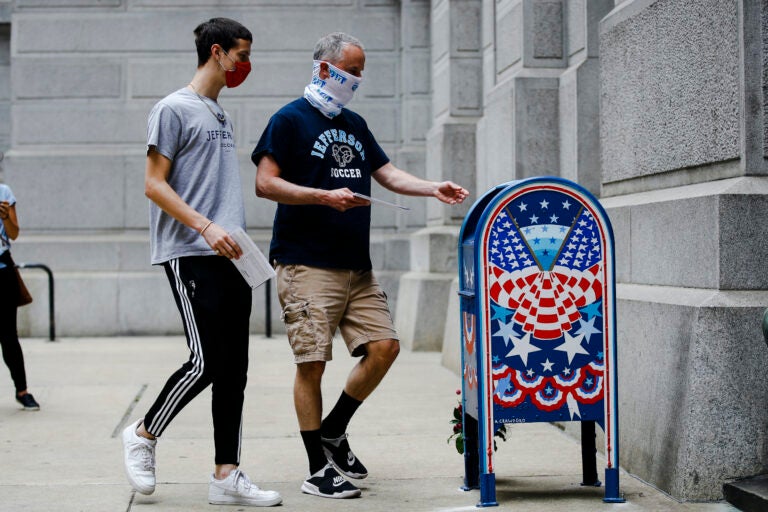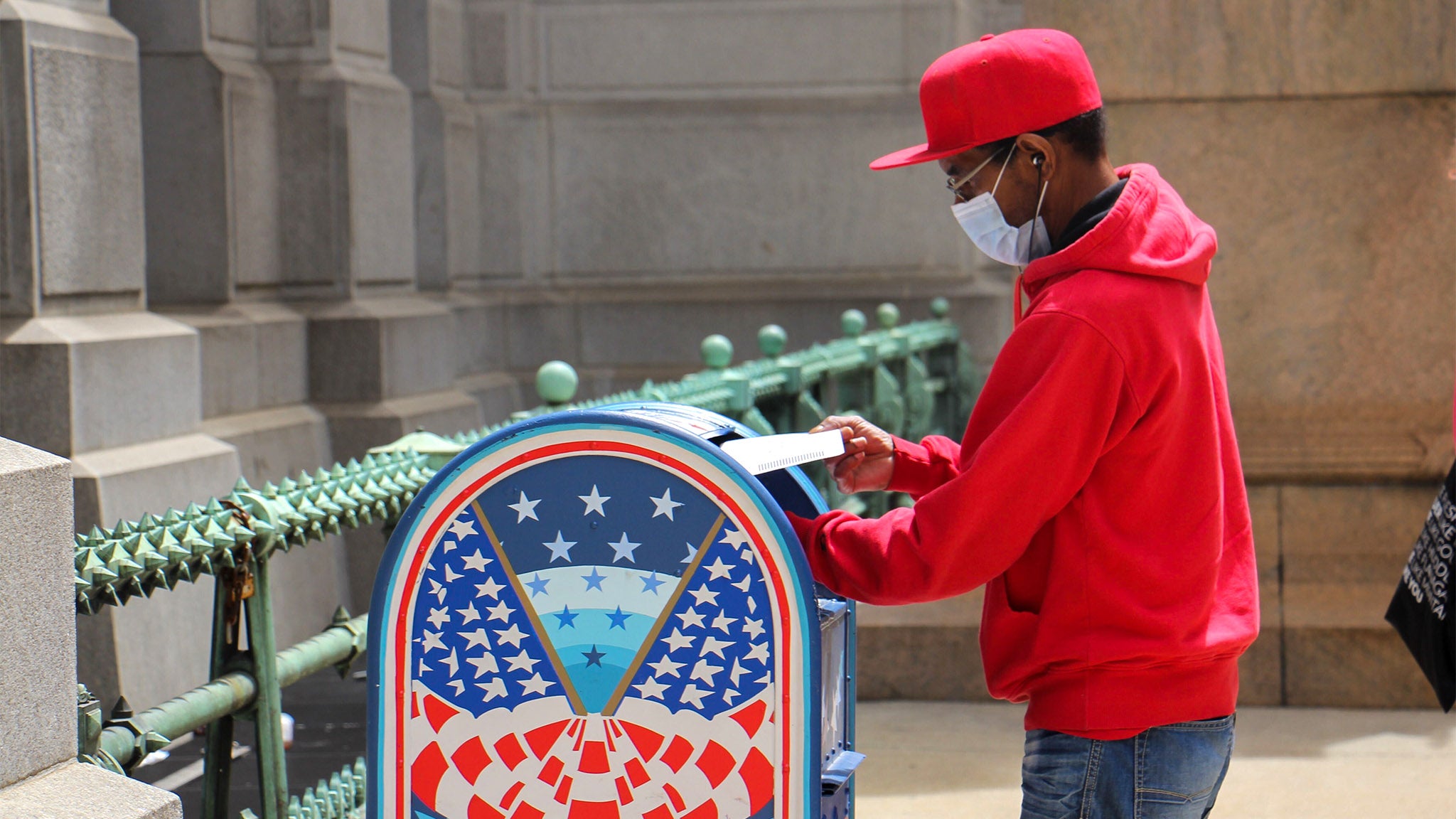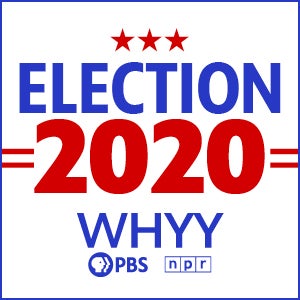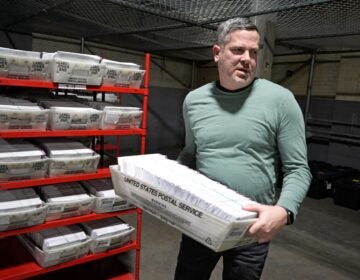Pa. campaigns weather uncertainty, keep election plans flexible as Nov. 3 approaches
From lawsuits to last-minute legislative changes, nobody really knows how Pa.’s election will work. Campaigns are figuring it out on the fly.

Benjamin Graff, center, and his son Jacob Graff, 19, drop off their mail ballots for the Pennsylvania primary election, in Philadelphia, Tuesday, June 2, 2020. (AP Photo/Matt Rourke)
It was still pretty early in the campaign cycle when Dena Gleason, who heads the campaign committee for Pennsylvania State House Democrats, knew she’d have to throw the usual playbook out the window.
“We wake up every day as nimble as possible,” she said. “At a moment’s notice, we’re ready to adjust.”
That nimbleness is becoming even more necessary in the final months before the election.
Big voting law changes, coupled with the global pandemic, nationwide social unrest and Pennsylvania’s status as a crucial swing state, meant that no matter what November 2020 would be high stakes for campaigns and state and county officials.
Several more recent developments have upped the ante.
Nationwide mail delays are calling into question whether ballots postmarked by Pennsylvania’s due date — right now, Election Day — can possibly be counted in time.
Gleason said the House Democratic Campaign Committee’s strategy has always been to inform voters of as many options for casting ballots as possible. The big change this year is that they’re trying to get out the messaging more quickly than ever.
“We’re making a push earlier than we might have in a normal situation, with a regularly functioning Postal Service,” she said. “The earlier we can get these requests in, these ballots sent back, that’s what we want to do.”
But the very options available to voters are also subject to change.
The GOP-controlled House has passed a measure that would — in deference to mail delays — require counties to send mail ballots to voters sooner, and start processing returned ones a little earlier. But it would also effectively eliminate ballot drop-boxes and allow poll watchers to monitor polls anywhere in the state, even if they don’t live there — a move some Democrats say could be a recipe for voter intimidation.
Democratic Gov. Tom Wolf says he won’t sign it as-is.
As legislative fixes to logistical problems are in flux, so are legal challenges to election procedure.
The Trump campaign and Republican National Committee are suing Pennsylvania in federal court in an effort to get rid of mail ballot drop boxes, challenge ballot-counting methods, and allow more flexibility in poll watcher assignments. A judge has put that suit on hold for now.
Groups aligned with Democrats, like the Priorities USA super PAC, are involved in lawsuits looking to extend deadlines for mail ballots to be received. The NAACP is also suing to get ballot applications sent to all voters, among other things.
“We are operating as if it won’t change, and we’re certainly working with our counterparts in the state party to make sure that we can preserve as many options for people to vote as humanly possible,” Gleason said of the prospect of losing drop-off boxes.
Senate Democrats and House and Senate Republicans did not respond to requests for comment about their own strategies amid the election flux, but mailers sent out by both parties show they seem to be thinking along similar lines as Gleason.
Even though many Pennsylvania Republicans have aligned themselves with President Donald Trump and have warned of potential fraud associated with mail-in voting, the state party’s website still gives voters clear instructions on how to cast ballots remotely.
An infographic describes the process as “safe” and “smart” since it includes “significant oversight protections to assure every vote is counted and accounted for,” and because “Democrats will use the new mail-in ballot to greatly increase their turnout. Republicans would be smart to do the same so that we have the advantage.”
GOP-aligned groups have also sent absentee ballots to prospective voters, just as many Democratic-aligned groups have done.

2020 and the Pa. legislature
Republicans have controlled the State Senate since 1994 and the House since 2010. Democrats would need to flip nine seats to win the House, and four to take the Senate. Gleason said more than any recent year, that’s “100 percent” the campaign committee’s explicit goal
Increasingly over the past decade or so, Democrats have focused most of their seat-flipping energy on the traditionally conservative, but increasingly moderate suburbs outside Philadelphia and Pittsburgh.
Republicans, meanwhile, have made big inroads in the blue-collar, formerly blue-voting northeast and west, beyond Pittsburgh and the suburbs.
One way to get a snapshot of the districts most likely to get flipped is to look at which House members have been voting against their parties on the most hot-button topic of the moment: the laws that will govern the election.
When the GOP-proposed and Wolf-opposed election law changes came up for a vote Wednesday, one moderate Southeastern Pennsylvania Republican, State Rep. Todd Stephens (R-Montgomery), opposed it.
Four Democrats supported it — State Reps. Frank Burns (D-Cambria), Gerald Mullery (D-Luzerne), Joe Petrarca (D-Westmoreland) and Pam Snyder (D-Greene).

Your go-to election coverage
WHYY is your source for fact-based, in-depth journalism and information. As a nonprofit organization, we rely on financial support from readers like you. Please give today.







